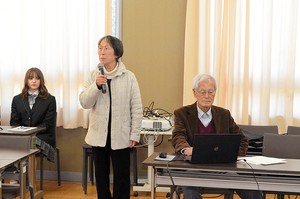By AMANE SUGAWARA/ Staff Writer
May 18, 2021 at 08:00 JST
 The Foreign Ministry building in Tokyo’s Chiyoda Ward (The Asahi Shimbun file photo)
The Foreign Ministry building in Tokyo’s Chiyoda Ward (The Asahi Shimbun file photo)
A Foreign Ministry survey showed more than 70 percent of Japanese support its approach to Myanmar after the coup, but one observer says the question was designed to provide positive PR for the government.
Ministry officials said the “Domestic Public Opinion Survey on Japan’s Diplomacy” was conducted by telephone on 1,000 people across the nation between March 20 and 23. The results were released in April.
The question concerning Myanmar first explained that Japan “has long been extending a helping hand to Myanmar for the sake of democratization, including by official development assistance, and has been calling persistently for a change through an approach different from that of Western countries, thereby establishing a unique position.”
The question then asked, “Do you think Japan should engage proactively in the situation surrounding Myanmar using its own communication channels?”
Thirty-eight percent of respondents said they “think so very much,” while 34 percent said they “think so to a certain extent.”
“Many people approved the view that Japan should work actively to improve the situation, including by using the connections it has with the Myanmar military,” a ministry official said.
The text of the questions in the survey were mutually agreed upon by the ministry’s public relations officials and the ministry’s departments in charge of issues mentioned in the survey, the officials added.
Masao Matsumoto, a professor emeritus of social survey with Saitama University, acknowledged that some explanations were necessary for questions in the survey, but the one for Myanmar led to an overwhelming positive response for the ministry’s approach.
“The context was set in such a manner that the answer could only be given in the affirmative,” Matsumoto said. “I get the impression the Foreign Ministry conducted the survey for the purpose of public relations.”
Foreign Press Secretary Tomoyuki Yoshida denied the assertion at a news conference on April 28.
“We did not pose questions with an intention to induce such and such answers,” Yoshida said. “But we will take account of any comments on the appropriateness (of the way the question was posed).”




















A peek through the music industry’s curtain at the producers who harnessed social media to help their idols go global.
A series based on diplomatic documents declassified by Japan’s Foreign Ministry
Here is a collection of first-hand accounts by “hibakusha” atomic bomb survivors.
Cooking experts, chefs and others involved in the field of food introduce their special recipes intertwined with their paths in life.
A series about Japanese-Americans and their memories of World War II